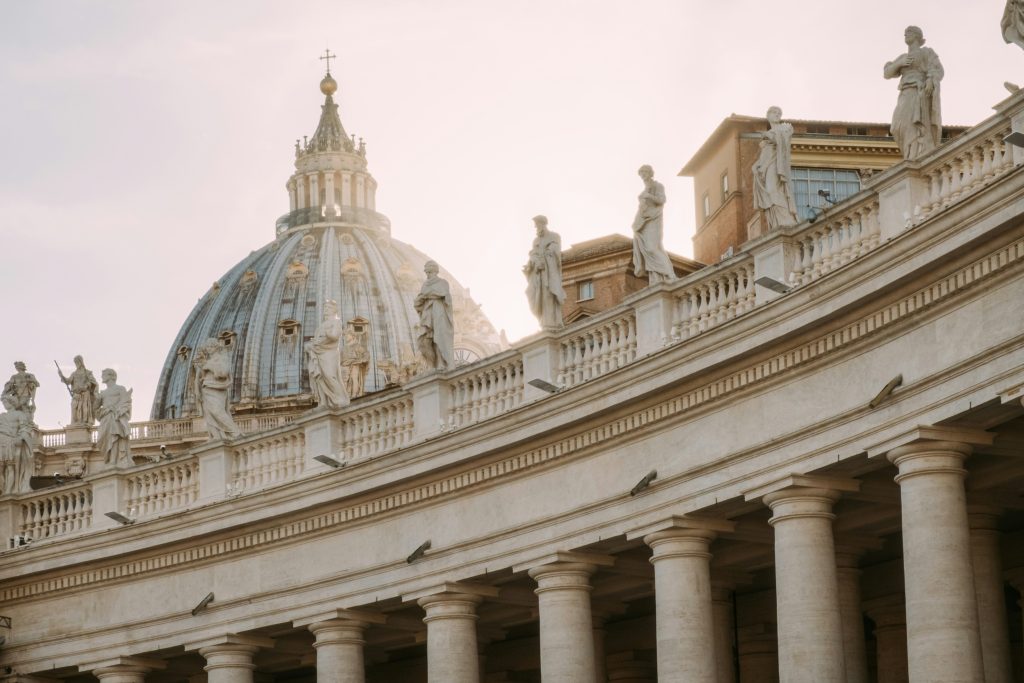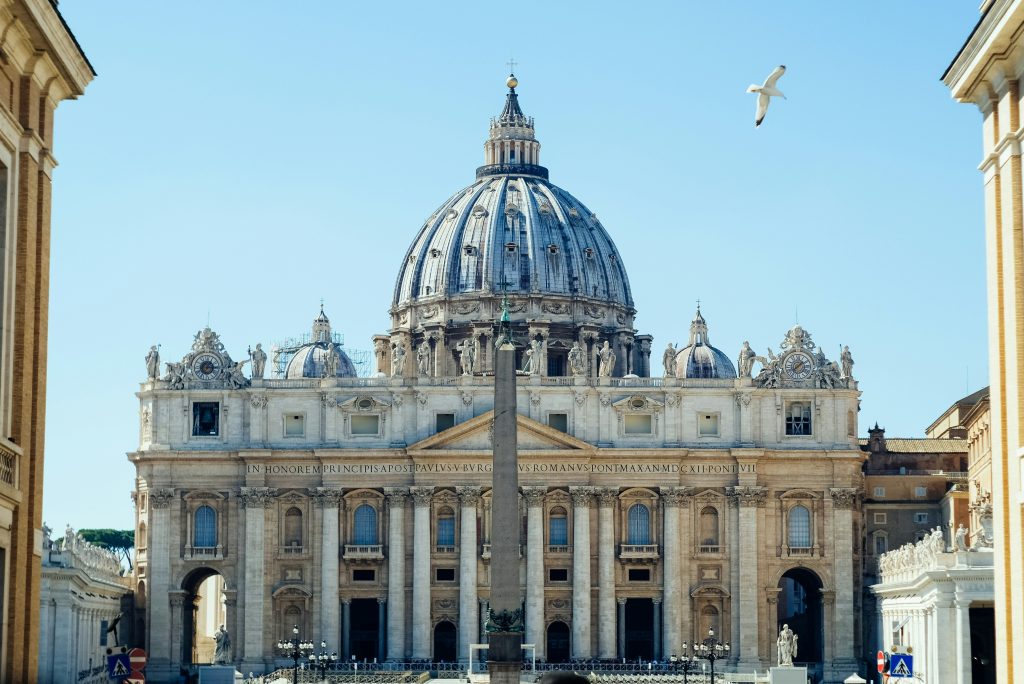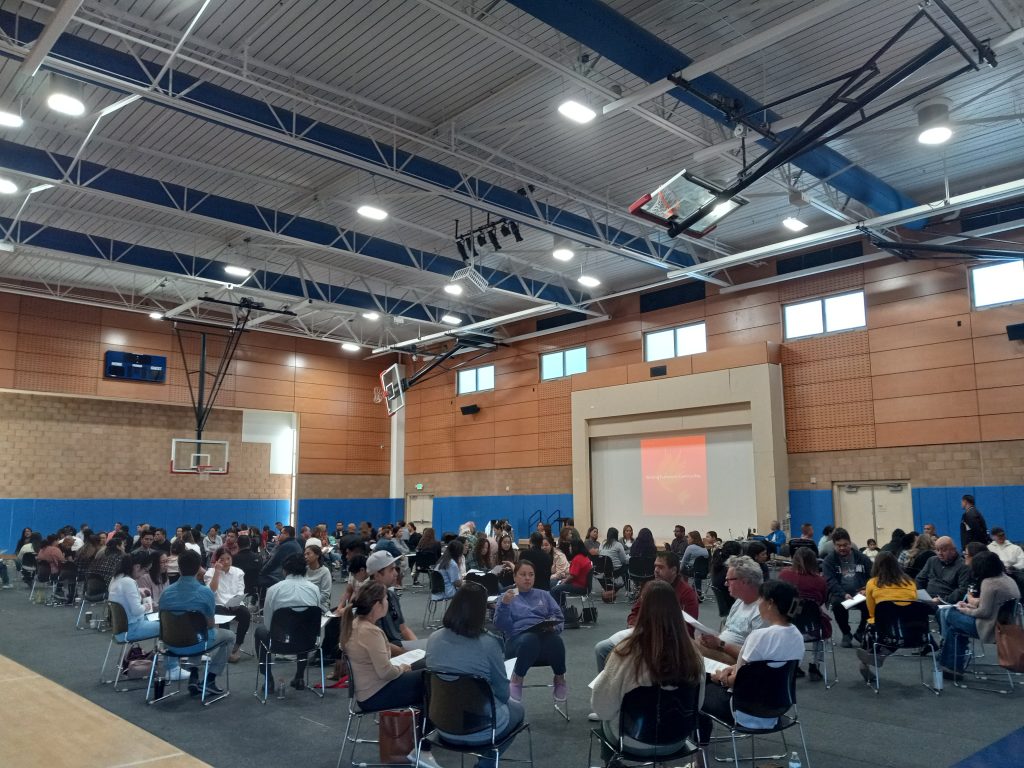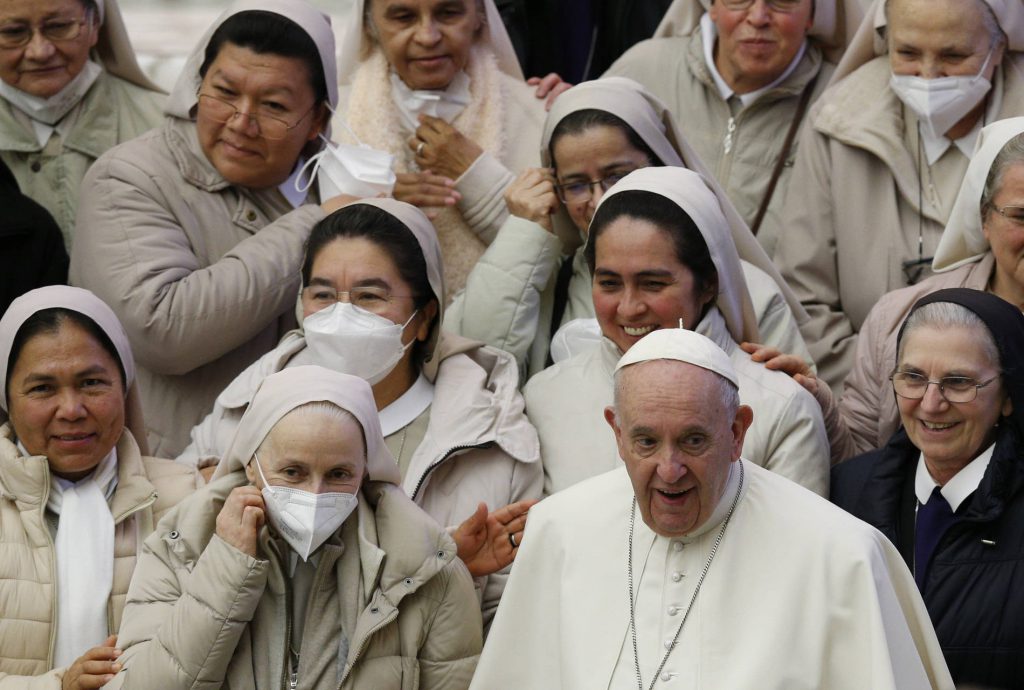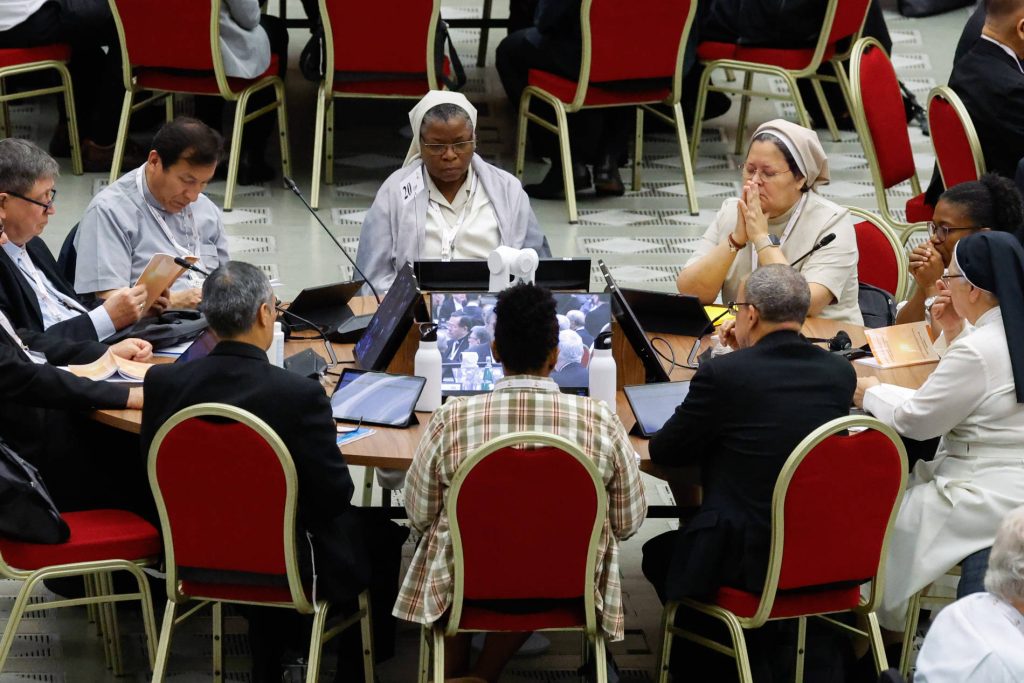Editor’s Note: The Diocese of San Diego is consulting its faithful in a synod. In March, parishes and organizations held small-group sessions to listen to their communities. The following is the report the diocese submitted to the U.S. Conference of Catholic Bishops that synthesized the themes that emerged in those 1,100 sessions. The synod continues with a survey of the faithful this fall. If they have not already done so, the faithful are invited to register with their parish to receive the survey.
The synodal process for the Diocese of San Diego began with the opening Mass on Oct. 17, 2021, in which Bishop Robert McElroy announced the appointment of a 15-member commission that would oversee the synodal process and design its framework. This commission included three pastors, two theologians and 10 lay leaders drawn from the leadership of the parishes, agencies and movements.
During its initial meetings, the commission, in concert with Bishop McElroy and in consultation with the Presbyteral Council and the Diocesan Pastoral Council, determined that the synodal framework for San Diego would be a three-year process based upon the “See-Judge-Act” model for ecclesial action.
The first stage of six months would include a series of listening sessions in English, Spanish and Vietnamese using the template of synodality to discern the response of the People of God to the three foundational synodal questions: What are the joys of the faithful in the life of the Church? What are their sorrows in the Church? What hopes do they have for the Church? From these sessions, a synthesis would be developed by June 30 to submit to the United States Conference of Catholic Bishops.
After this initial phase of listening, the commission would undertake a process of discernment to evaluate the findings of the listening sessions. Then the commission would create, in light of the small-group conclusions, an instrument for large-scale consultation of the People of God that would be sent to more than 150,000 Catholics for their input on the key issues confronting the Church at this moment. The results of this process should be finalized in October.
The second year of the synodal process was planned to be devoted to a period of discernment as to the realities and opinions revealed in the small-group processes and the large-scale questionnaire. The commission will seek to outline what changes need to be accomplished at the parish and diocesan levels, and to form an action plan specifying the goals for change. Just as importantly, the plan will speak to the synodal culture that must be reflected in this change. It is particularly important that, in this stage of the synodal process, all participants keep in mind that we are seeking to accomplish a genuine conversion of dialogue, decision-making and pastoral life in the Church. Thus, how we undertake action is as important as the specified goals that we are seeking to achieve.
The third year of the synodal process in San Diego will be devoted to implementing the action plan at the diocesan and parochial levels.
The commission struggled with the dramatic differences in culture and realities between San Diego County and Imperial County. San Diego is a largely urban and suburban county with more than 3 million people that is demographically diverse, containing a vibrant technology-centered economy. Imperial County is an agrarian region of approximately 200,000 residents, of whom 85 percent are Hispanic. As a consequence, the synodal participants decided to establish two commissions for the synodal process in the diocese, one for each county. This allows for synodal frameworks tailored to the specific needs of each county.
A great deal of time has been devoted by the commissions to designing a small-group dialogue process that could reflect and build an ethos of synodality. Faculty from San Diego State University attended our commission meetings and designed a framework for meaningful small-group interactions that fosters respectful listening, invites concise sharing of personal experiences, and provides for the gradual building of understanding amidst diverse backgrounds, cultures and ideologies. They also helped design a note-taking process that would capture the central elements of what was being said in each group.
During March, each of the parishes of the diocese held a series of three-hour meetings in which men and women sat together in random small groups of eight people to reflect upon the joys, the sorrows and the hopes which they have found in the Church. More than 10,000 people participated in these meetings. One of the most interesting outcomes was that overwhelmingly the participants found these dialogues spiritually and pastorally very nourishing. Several small groups decided to form ongoing prayer or Bible study groups with one another on the basis of their sharing, even though they were virtually strangers before the sessions. The positivity of the experience was remarkable because the notes taken in these small groups reveal that participants shared immensely different viewpoints on the major issues they were discussing. This prayerfulness and respect of the dialogue constituted a glimpse of what a synodal culture might be.
The commissions established particular synodal small-group sessions for the diocesan priests, the religious men, the religious women and the permanent deacons and their wives. These meetings were designed to capture the distinctive perspectives of these leadership groups in the life of the Church.
In addition, the commissions discussed at length the question of how to elicit contributions from our marginalized communities. Because approximately 200,000 Catholics in the diocese are immigrants, the parish dialogues would capture their input. The commissions, however, designed a specific process to ascertain the experiences of our many refugees and migrant workers. In addition, specific outreach mechanisms were established to elicit the input of the incarcerated and their families, as well as homeless men and women. The interpretive lens established through the University of San Diego to analyze the small-group meeting data included a process to amplify the input of these marginalized communities in formulating our conclusions for this synthesis being sent to Washington, and ultimately to Rome.
A parallel process of consultation was developed for the teenagers in our schools and religious education programs.
During the 1,100 small-group meetings, a note-taker was assigned to each group to record as accurately as possible individuals’ responses to the three foundational questions of the joys, the sorrows and the hopes that people found in the Church. In the subsequent process of analyzing the fruits of these small-group dialogues, four individuals read through a representative sample of recorder notes and collaboratively generated coding categories that were applicable to what they had read. The codes were used to analyze the meeting notes from sample parishes using a multiple-variation sampling strategy. Then all 1,100 sets of notes were examined. From this analysis, eight central themes emerged. Four of them centered upon the joys participants found in the Church. Four of them focused on the challenges participants found in the life of our local Church.
JOYS
1) The Sacramental Life of the Church: The principal joy that emerged in the synodal sessions was participation in the sacramental life of the Church. The declaration of one participant that “experiencing the beauty of our Church/Mass with our families is what brings us hope” was emblematic of comments in virtually every small-group sharing. Participants rejoiced in the fundamental nature of the Eucharist, pointing out that “you can attend Mass anywhere in the world and it’s the same.” A very large number of participants mentioned how the music in the liturgy brought great emotion and spiritual depth into their lives. One participant’s comment summarized this joy in the Eucharist: “I love the peace I feel when I go to Mass. It’s a chance to really speak to God and find rest.”
The other sacraments were frequently mentioned as a source of joy as well. In these comments, participants frequently referred to specific sacramental moments that had been meaningful in their lives, rather than a generalized sense of sacramentality. Baptisms constitute a time of deep grace in the life of the faithful, as do celebrations of First Eucharist and weddings. One individual expressed this reality: “Experiencing these sacraments in our lives and the lives of our children brings a lot of joy.” Many comments pointed to the kindness and pastoral devotion of the priests and deacons that celebrate these sacraments.
The rosary is seen as a quasi-sacramental reality of great importance in the life of the People of God in San Diego and Imperial counties.
2) Community Life: The presence of enduring community life within parishes and the movements is also a source of immense joy for the faithful in our diocese. Men and women pointed frequently to the sense of belonging that they have experienced in the life of the Church. These bonds of community exist on a variety of levels – spiritual ties, friendships that have been formed within the life of the community, service actions and recreational and social events. During the period of COVID, the vibrancy of parish life and the movements diminished appreciably, but it is returning to full vitality at this moment. It cannot be stressed how strongly the synodal dialogues reflected a joy in and hunger for the web of communities that are formed in the life of the Church.
3) Priestly ministry: There is widespread support for and admiration of their parish priests. “The priests at the local level are the lifeblood of the Church.” The pastoral service of celebrating the Eucharist and the other sacraments, forming parish community, guiding individuals in distress and teaching the faith form strong bonds between the parish community and the priest. The comments of the dialogue participants also show an understanding that the limited number of priests creates great hardships and limitations in effective ministry.
4) The Church as a Pathway to God: Those who participated in the 1,100 dialogue groups held within the diocese continually pointed to the Church as their primary pathway to God. They spoke of Scripture study groups that revealed to them the beauty of the Bible. They discussed their experiences in Cursillo, respect life groups, matrimonios, and cultural devotional groups which have provided engagement with God and God’s action in the world. They spoke of simply visiting the church in prayer and encountering the face of God, as well as adoration of the They spoke of the many ways in which the parish community as a whole, priests, deacons and lay leaders in the parish point them toward the Lord. There was a broad concern to retain the popular religious traditions that reinforce cultural ties to faith. On so many levels, the participants testified to the reality of Church as the pilgrim people of God journeying toward the Kingdom.
Many comments in the dialogues spoke of a desire to bring more people into the life of the Church. There was an emphasis on creating a culture of welcoming and hospitality in the life of the diocese and the parishes. At the same time, there was very little organized sense of evangelization among participants.
CHALLENGES
While the four sources of joy listed above constitute an affirmation of the life of the Church in the Diocese of San Diego, four major challenges to the faith and the vibrancy of the Church in San Diego and Imperial counties also surfaced in the dialogues.
1) Issues of Youth and Young Families: The overwhelmingly dominant sadness expressed in the synodal dialogues was the failure of the Church to engage with children, teens and young adults. There is widespread belief that the Church has not taken sufficient steps to develop pastoral outreaches that are meaningful to the new generation. This sadness is almost a sense of despondency, of the inevitability of continuing decline in the participation of young people in all elements of Catholic life. “The Church does not modernize the Gospel for children and young adults.” “The Church does not do a good job of communication and connecting to young people.”
Many participants pointed to the greater success that many Protestant churches have in engaging with the young. Participants suggested practices the Catholic Church could adopt to engage children and adolescents without necessarily embracing some of the more intensive pop-culture-influenced forms of worship embraced by certain evangelical churches. Many people pointed to strategies that have been initiated in isolated pockets of the diocese: Masses for teens and young adults followed by dinners and other social gatherings. Many suggested more strenuous efforts to modernize the Gospel while respecting its integrity. The suggestion of one participant captures this widespread vantage point: “Fellowship activities, youth retreats, praise nights, youth Bible studies of sharing sessions to get the young kids to come to Church, to make friends, to make those connections with mentors so they stay in the Church and eventually serve in the future.”
Not all participants who spoke on the outflow of teens and young adults blame the Church for this trend. Many took responsibility for failing to sufficiently witness to and support their own children in the faith. “I was an altar server as a boy, but as an adult I did not attend regular Mass or participate. I realize now that, because I did not do that, my children do not have that tradition and faith life. I have found a new life of faith and pray the rosary, but I do feel regret for my lapsed past.”
There were also joys participants expressed about witnessing and participating in the Church’s meaningful efforts to engage teens, young adults and young families. Significant numbers of parents spoke of the tremendous support that Catholic schools provide for the faith of the young. At the same time, there were many comments about the significant class inequalities caused by the high cost of tuitions, and many parents noted that Catholic schools have generally been unable to assist special-needs students. The sacrifices of religious education teachers were also noted in many small groups.
2) Anger at the Clergy Sexual Abuse Scandals: The intensity of the emotions expressed on the topic of clergy sexual abuse of minors was profound and widespread. “Sexual abuse was allowed to get so big and destroy the Church and people who love the Church.” “The priest scandals make it difficult to attract people to the faith and, at the same time, require having to defend the faith.” Participants specifically noted that “it was the cover-up conducted by the bishops, rather than individual cases that disappointed them, and then seeing the same level of cover-up exposed not just in one diocese, or in one country, but rather across the globe –- that was particularly disappointing.” There is a nearly universal perception that bishops were the core of the patterns of abuse and reassignment because bishops sided with guilty priests against the imperative to safeguard children and young people.
3) Inclusiveness and Acceptance vs. Doctrinal Strength: The synodal dialogues revealed a profound split within the Catholic community about the issues of acceptance versus conformity with rules. This split reflects elements of the cultural and political divides that plague our society. But it takes on a specific form within the life of the Church.
Those seeking greater acceptance of diversity in background and lifestyles generally pointed to the suffering and scandal that have been generated by the exclusion of particular groups in the life of the Church. The role of women was frequently discussed as an example of unchristian exclusion. Many men and women spoke of their disagreement with the idea that the Church will not ordain women or married priests, and these participants pointed to a history and culture of according only a secondary status to the group that forms the majority of the believers and volunteers in the Church.
The LGBT community got even more attention than women from those advocating for making a greater effort to include marginalized groups and individuals in the Church. At times, the support for inclusion exhibited a litany of past incidents of exclusion, bigotry and suffering because of Church teaching and practice. There were significant expressions of support for the Church’s efforts to invite LGBT Catholics into the heart of the Church at the present moment, but a sadness that these efforts are not more widely and deeply embedded.
Typical of those pressing for broader acceptance in the Church was the comment of one participant: “I hope for our Church to be accepting of anybody and not just say or indicate ‘you are not part of the group.’ I want our Church to be accepting of each person for who they are. I hope for our Church not to be judgmental of anyone, as we don’t know the shoes they are wearing, but instead be accepting and make them feel they belong.”
The counterpoint to this widespread call for greater inclusion in the life of the Church is a belief by many that Catholic teaching has compromised too much in the current secular moment and has grown too lenient. “The Church does not seem to have a clear message on how they view people who have same-sex attraction or LGBT,” one participant said. “There does not seem to be a clear guidance on that issue.”
Many participants expressed the view that Church doctrine is quite clear on debated issues, but the Church’s current leadership has intentionally obscured that teaching on LGBT issues and other topics, including abortion. These Catholics raise concerns that Pope Francis has introduced a corrosive ambiguity into the heart of Catholic moral doctrine. They are highly critical of Bishop McElroy for this same reason.
Participants who share this viewpoint worry that Catholic doctrine lies on a slippery slope in these days, and propose that sharpening the line between the Church and secular society would have a reinvigorating effect for the Catholic community.
4) Pastoral Problems: At the same time, a significant number of men and women in the synodal sessions pointed to painful experiences of pastoral insensitivity or refusal of sacraments by priests. Many of these experiences revolve around individuals undergoing great grief or suffering in their own lives or those of their families. Moments of unavailability for sick calls or funerals, priests who are curt at weddings, or who place too much stress on the payment of money for services, all detract from the witness of priesthood that the Church values. The synod sessions surfaced many calls for better homilies which are pastoral and uplifting. A number of participants raised the issue that different priests give conflicting pastoral advice on moral questions.
As to the comments of the synodal dialogues on the bishops of the United States, participants were highly negative. Many blame the bishops for the egregious errors of the clergy sexual abuse crisis. They think that the episcopacy has contributed enormously to a culture of clericalism.
At the same time, the dialogues pointed to patterns of marginalization within the community life of the Church. The homeless and incarcerated participants reflected a belief that they are judged and excluded on many levels within the Church. The issue of favoritism within the parish communities and within the presbyterate is a source of friction. Economic status, legal status and race are perceived by many as a foundation for second-class treatment by some at all levels within the Church. Religious women pointed to both historic and contemporary situations in which they have been marginalized by clergy. Priests are burdened by the stigma of the sexual abuse crisis, which they feel casts a pall on every priest.
The ideological divisions of the current moment are tragically present in parish communities, leaving individuals ranging from proponents of “Laudato Si” to home-school families with the sense that they are suspect by significant elements of the parish community. Even though Catholic social teaching calls for a dedication to the wide spectrum of issues that are morally compelling in the present moment, there is dramatic disagreement about what this means. Many participants believe that the preeminence of abortion as a moral evil in our society constitutes an overriding claim upon the Catholic conscience; these men and women see fighting for legal protections for the unborn as purely a moral issue, not a political one. The countervailing group in the parishes see poverty, race, immigration and the environment as an equally important set of issues to be addressed in society.
Next Steps
Immediately after the completion of the synodal dialogues, the commissions recognized that there had to be timely follow-up to major issues which had surfaced in our parishes and at the diocesan level. During the dialogues, many participants expressed the fear that the conclusions of the listening sessions would simply be put on the shelf; that no substantive follow-up would occur. The commissions felt that there was a great danger of this happening, especially because the global process points to the culmination of the synod and an Apostolic exhortation in 2024. The commission members concluded that there should be rapid action on key local issues that had been raised in each parish and throughout the diocese. For this reason, each parish will be asked to identify two substantive issues that had been raised at its parish dialogues, with the aim of addressing them in the fall of this year. And the Diocesan Pastoral Council will draw from the dialogue mandates to establish concrete goals for immediate action.
This will not only provide substantive reforms to distinct elements of our parochial and diocesan life; it will also provide additional opportunities to bring the hallmarks of synodality to the processes of parish and diocesan pastoral planning and decision-making. In addition, it will provide a direct feedback loop to the synodal small-group dialogues.
Finally, we call upon the Universal Church to address in the synodal process key questions that divide our local Church: the inclusion of LGBT communities as well as the status of women. We must press for the deepening of a commitment to Catholic social teaching so that abortion, care for creation, race, economic inequity and immigration are addressed meaningfully. We must globally bridge the perceived division between inclusion and doctrinal fidelity that has surfaced in the Church. We must bring a truly pastoral perspective that renews our practices regarding marriage and family life and sacramental participation. We must strengthen adult faith formation. And we must forge new networks for evangelization of the culture and the world.
Follow this process at sdcatholic.org/synod.





